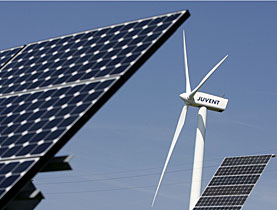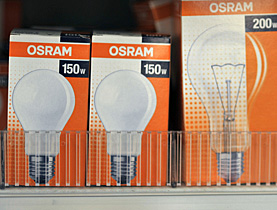“Nuclear cent” eco tax fuels criticism

Government plans for a tax on nuclear power to fund renewable energy have come under fire from power firms and Greenpeace.
Energy Minister Moritz Leuenberger says the government is looking into a “nuclear cent” tax that would be levied on extra profits made by nuclear plants that extend their working life beyond the current 40 years.
Nuclear power stations have been given a new lease of life, with the previous working limit of 40 years now lifted and stations able to stay in service as long as they meet safety regulations. Operators now believe stations could have a lifetime of up to 55 years.
Leuenberger told the German-language SonntagsZeitung newspaper that if the plants were making extra profits as a result, some of that money could go toward renewable energies such as solar, geothermal or wind power.
A similar “climate cent” tax already exists in Switzerland, with a SFr0.015 per litre charge on petrol and diesel imports in place since 2005, generating around SFr100 million ($98.9 million) for projects reducing carbon emissions.
But power firms say the nuclear cent idea, set to be discussed by the government and interested parties, is flawed. Greenpeace goes further and says its basic premise is wrong.
Safety issue
“We think it is a bad idea. It is the wrong incentive and sends out the wrong signal politically,” Urs Wittwer, anti-nuclear campaigner at Greenpeace Switzerland, told swissinfo.ch.
“We at Greenpeace do not want nuclear power stations to run for 50 or 55 years or even longer. Power stations around the world are shut down on average at 22 years. Nobody has an idea what happens after 50-55 years. We have no idea whether it possible to run nuclear power stations for that long in a safe enough way.”
He argued that Switzerland needed to decide what kind of energy system it wanted for the next century. It “doesn’t fit together” to extend the life of power stations, allow new ones to be built, while also promoting renewable energies, he said.
Instead Greenpeace suggests doubling or even tripling an existing green energy surcharge of 0.45 cents per kilowatt hour of electricity that has been levied by the government since the start of 2009. The surcharge will be used to create a fund of SFr250 million a year which dispenses money for renewable energy projects.
“This is a huge success. [This year] the fund was emptied within a few weeks. People want to install renewable energies. The basic idea of funding renewable energies is alright but not with a longer running time of power stations.”
The Axpo power firm told swissinfo.ch that it opposed the idea of a nuclear cent, stating that such a tax would further increase electricity prices for industry and households.
BKW FMB Energy commented that the idea was not new – plans for a similar nuclear tax of 0.3 centimes per kilowatt hour were rejected by the government in 2003.
Both firms argued that extra profits would not necessarily be made if nuclear plants carried on beyond 40 years, as investment was needed to ensure the plants were safe and kept maintained.
Targets
But the energy minister says the nuclear cent tax under discussion would be different to the 2003 proposal as it would not increase the cost of the nuclear plants and rely on extra profits. It was also a “sustainable” way of investing in renewable energies.
“Giving [profits] back to consumers would not encourage people to save energy. The amount of energy wasted in private households is still huge,” he said.
For such a nuclear tax to work and be used constructively, it would have to have clear targets and reference points, according to Marco Berg, managing director of the Climate Cent Foundation which is in charge of distributing money earned from the climate cent tax.
“We have been set a quantitative target of how much CO2 we have to reduce. The question is would there be a target at all and what kind of target would it be,” Berg told swissinfo.ch.
“We have to prove that with the money that we are spending for CO2 reduction measures, these measures are really having an effect of reducing CO2.”
He said it was also important to remember that such a tax would only be part of the solution: “It’s just an element of a broad strategy.”
Jessica Dacey, swissinfo.ch
55% hydroelectric
40% nuclear
5% other, such as renewable energy – wind, solar and fossil fuel power
Source: Federal Energy Office 2008
The revised Energy Act 2007 ruled that electricity production from renewable energies must be increased by at least 5.4 billion kilowatt hours by 2030.
This corresponds to around 10% of current electricity consumption (2008: 58.7 billion kilowatt hours).
To this end, the act contained a package of measures aimed at promoting renewable energies and energy efficiency in the electricity sector, the mainstay of which is the cost-covering remuneration scheme for electricity generated from renewable energies. This form of remuneration is to apply to the following technologies: hydropower (up to 10 megawatts), photovoltaics, wind energy, geothermal energy, biomass and waste material from biomass.
The sum of around SFr247 million per annum was set out to be available for offsetting the difference between remuneration and market price.
To fund the measures the Act enforced that that from January 1, 2009 a surcharge would be levied on every kilowatt hour used to finance cost-covering remuneration for electricity from renewable energies and the additional green energy-promoting measures. The act stipulates that this surcharge must not exceed 0.6 cents and will be set at an appropriate level each year by the Federal Office of Energy.
The government announced in August 2009 that Swiss electricity consumers would continue to pay a surcharge of 0.45 cents per kilowatt hour of electricity in 2010 to fund the production of green energy.

In compliance with the JTI standards
More: SWI swissinfo.ch certified by the Journalism Trust Initiative












You can find an overview of ongoing debates with our journalists here . Please join us!
If you want to start a conversation about a topic raised in this article or want to report factual errors, email us at english@swissinfo.ch.